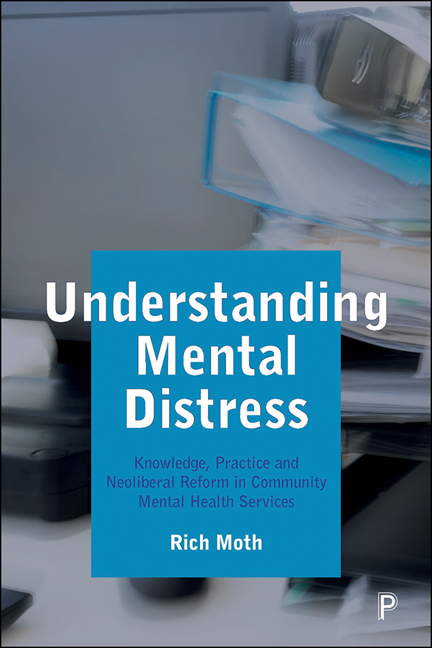 Understanding Mental Distress
Understanding Mental Distress Book contents
- Frontmatter
- Dedication
- Contents
- List of tables
- List of abbreviations
- Notes on the author
- Acknowledgements
- Introduction
- PART I Sociohistorical contexts of policy and practice
- PART II Lived experiences of neoliberal reform
- PART III Theorising knowledge and practice
- Conclusion
- Appendix: methodology
- Notes
- References
- Index
3 - Time, trust and relational practice
Published online by Cambridge University Press: 08 October 2022
- Frontmatter
- Dedication
- Contents
- List of tables
- List of abbreviations
- Notes on the author
- Acknowledgements
- Introduction
- PART I Sociohistorical contexts of policy and practice
- PART II Lived experiences of neoliberal reform
- PART III Theorising knowledge and practice
- Conclusion
- Appendix: methodology
- Notes
- References
- Index
Summary
The previous chapter highlighted the changing labour process at Southville Community Mental Health Team (CMHT), in particular the shift from relational to informational practices. These changes are driven by neoliberal welfare state reforms to embed marketisation and consumerisation while promoting the devolution of responsibility for managing various forms of risk to individual service users and practitioners. In combination, these dynamics constrain spaces for mental health workers to engage in supportive social-relational interventions and reinforce defensive and controlling forms of practice. This chapter is about the implications of those changes for service users, in particular how reductions in time impact on the possibilities for trusting relationships between service users and workers in CMHTs. The chapter explores this theme by presenting the perspectives of six service users at Southville CMHT, with some additional reflections from their care coordinators.
Time, trust and relational practice in mental health services
The operation of mental health provision has long been characterised as oppressive by many service users (Crossley, 2006; Survivors History Group, 2011). But the advent of community care offered at least the potential for more humane and relational alternatives to institutionalisation and hospital care (Rogers and Pilgrim, 2001). Research evidence from both service user and service provider perspectives has identified the importance of effective relationships and working alliances between workers and service users. Within mental health services, the establishment of trust constitutes an important foundation for relationship building through open and cooperative communication and knowledge exchange (Kirsh and Tate, 2006; Brown and Calnan, 2012; Beresford, 2016). This requires attention to interpersonal, psychosocial and wider systemic levels.
Trust and relational practice
At the interpersonal level, personal qualities such as care and competence are key to building service users’ trust in professionals (Calnan and Sandford, 2004). User movement critiques of paternalism within welfare services also advocate an orientation towards mutuality and the valuing of expertise by experience (Pilgrim et al, 2011; Beresford, 2016). Similarly, proponents of humane professionalism have highlighted how a collaborative dynamic can create a reciprocal and respectful exchange of knowledge and expertise (Pithouse et al, 2012). They argue, too, that orientation towards advocacy and holistic understandings of need help to build trusting relationships (Stewart et al, 2014).
- Type
- Chapter
- Information
- Understanding Mental DistressKnowledge, Practice and Neoliberal Reform in Community Mental Health Services, pp. 53 - 81Publisher: Bristol University PressPrint publication year: 2022


